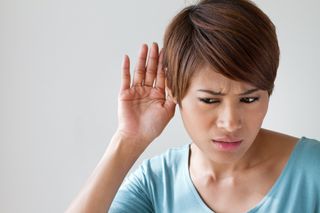Why We Find It Harder to Filter Out Background Noise As We Age

The problem becomes more common as we age: A friend is talking to you, you see his mouth moving and you hear his voice, but amid the din of other voices and music, you just can't make out the words.
Part of the issue, new research finds, may lie not in the ear itself but rather in the brain's ability to filter out background noise and zero in on the sound of one voice.
"Our ability to hear in noisy conditions depends on how well our brain rhythms synchronize with the rhythms of the sound we're trying to listen to," said Molly Henry, a postdoctoral researcher in neuroscience at the University of Western Ontario and lead author of the study, which appears today (June 27) in the journal Nature Communications.
In the U.S., hearing loss affects about 1 in 3 people between the ages of 65 and 74 and nearly half of people over age 75, according to the National Institutes of Health.
In Henry's study, conducted while she was a postdoctoral researcher at the Max Planck Institute in Germany, she and her colleagues analyzed what happens in the brain when older adults have trouble listening in loud environments. [10 Things You Didn't Know About the Brain]
The researchers used a technology called electroencephalography, which involves having the participants wear a cap with many electrodes. In the study, the researchers monitored the brains of 20 younger adults ages 18 to 31, and 20 older adults in their 60s and 70s, during a listening task.
Each person was essentially placed in the loud party scenario. A constant background noise — in this case, a sound resembling a U.S. police siren — blared away while the participants were instructed to try detecting target signals. As they did this, the electrode-outfitted cap on their heads measured electrical activity generated by the coordinated firing of neurons in their brains.
Sign up for the Live Science daily newsletter now
Get the world’s most fascinating discoveries delivered straight to your inbox.
Hearing a voice required the participants to both suppress the irrelevant noise and enhance the important sound, the study found.
"When you listen to a sound, electrical firing in your brain synchronizes with the rhythm of the sound so they have the same temporal structure," Henry told Live Science. "This allows you to predict upcoming information."
The researchers found that the younger adults were able to zero in on the target signals while filtering out the irrelevant noise.
Brain signals in the older adults, on the other hand, showed that they had a harder time tuning out the background noise. Neural signals in the older adults' brains fired away in a pattern synchronized with the irrelevant siren noise, and that inhibited their ability to detect the target signals. [27 Oddest Medical Cases]
"For the older adults, it all kind of mixes together, creating an overall noisy situation," Henry said.
One aspect of this type of filtering is less clear, and Henry offered two possible explanations. It could be that degradation of the ear's ability to hear actually leads to a decline in the brain's ability to filter out noise and hear a single sound. Or, it could be that the brain's listening ability erodes independently of any changes going on in the ear. The older adults in the study were not hearing-impaired and had "good levels of hearing," Henry said, but their hearing was still not as good as that of the younger adults.
"Is hearing loss leading to the brain changes? Or are the brain changes also happening on their own?" Henry said. "That's what we don't really know yet."
It's a key question as the U.S. population ages and more people face age-related hearing loss. The number of Americans ages 65 and older is projected to more than double from 46 million today to over 98 million by 2060, according to the Population Reference Bureau.
Hearing aids may help some people, but the devices don't always help people whose hearing loss is linked mainly to the brain, Henry added.
"The truth is that hearing aids often don't work very well," she said. "We need to understand what's happening in the brain."
Originally published on Live Science.


